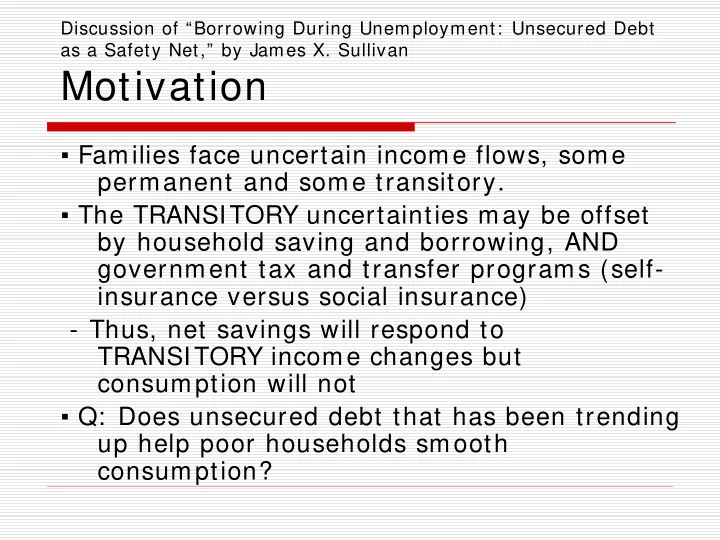

Discussion of “Borrowing During Unemployment: Unsecured Debt as a Safety Net,” by James X. Sullivan Motivation ▪ Families face uncertain income flows, some permanent and some transitory. ▪ The TRANSITORY uncertainties may be offset by household saving and borrowing, AND government tax and transfer programs (self- insurance versus social insurance) - Thus, net savings will respond to TRANSITORY income changes but consumption will not ▪ Q: Does unsecured debt that has been trending up help poor households smooth consumption?
Discussion of “Borrowing During Unemployment: Unsecured Debt as a Safety Net,” by James X. Sullivan Comments ▪ Challenges - Is the identified unemployment spell truly transitory? - What is the role of government transfer programs, the UI program in particular? ▪ Policy lessons - Poor people have little safety net!! (the failure of government transfer programs?!) - Households are living beyond their means?! (record level personal bankruptcy!!)
Discussion of “Negative Effects of Bankruptcy for Homeowners: Reduced Access to Credit and Lost Option Value,” by Cheryl Long Contribution ▪ Extremely important question because - Mortgages are households’ largest debt - Households in financial trouble often cannot meet the payment of any obligation ▪ Quantify the negative effects of personal bankruptcy filing on homeowners - Increased probability of losing their homes because of reduced access to credit - Lost option to file again ▪ Results: Negative effects large!!
Discussion of “Negative Effects of Bankruptcy for Homeowners: Reduced Access to Credit and Lost Option Value,” by Cheryl Long Comments ▪ Caution in interpreting the results - Homeowners optimally choose default sequence? (State foreclosure laws govern when borrowers default on mortgages. Bankruptcy filing stops the foreclosure process for up to 6 months or a year) - Homeowners file more often under Chap. 13 (thus, they can file repeatedly) ▪ Policy lesson: Optimal bankruptcy design needs to take into consideration laws governing secured debt and vice versa!!
Recommend
More recommend